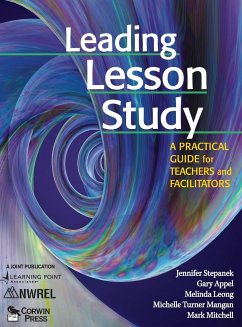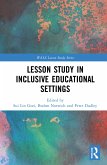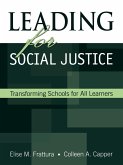Jennifer Stepanek, Gary Appel, Melinda Leong
Leading Lesson Study
A Practical Guide for Teachers and Facilitators
Schade – dieser Artikel ist leider ausverkauft. Sobald wir wissen, ob und wann der Artikel wieder verfügbar ist, informieren wir Sie an dieser Stelle.
Jennifer Stepanek, Gary Appel, Melinda Leong
Leading Lesson Study
A Practical Guide for Teachers and Facilitators
- Gebundenes Buch
- Merkliste
- Auf die Merkliste
- Bewerten Bewerten
- Teilen
- Produkt teilen
- Produkterinnerung
- Produkterinnerung
Use this team-centered approach to directly enhance teaching and learning in your school! First introduced in Japan, lesson study has gained enthusiastic advocates in US educational circles as a powerful, collaborative approach. This "how-to" guide leads a beginning team through the lesson study cycle and provides an experienced team with new perspectives. Using examples from U.S. classrooms, this handbook: Encourages educators to generate and share knowledge Inspires a teacherresearcher stance Illustrates both the process and substance of lesson study Encourages collaboration Provides guidelines for avoiding common pitfalls…mehr
Andere Kunden interessierten sich auch für
Use this team-centered approach to directly enhance teaching and learning in your school! First introduced in Japan, lesson study has gained enthusiastic advocates in US educational circles as a powerful, collaborative approach. This "how-to" guide leads a beginning team through the lesson study cycle and provides an experienced team with new perspectives. Using examples from U.S. classrooms, this handbook: Encourages educators to generate and share knowledge Inspires a teacherresearcher stance Illustrates both the process and substance of lesson study Encourages collaboration Provides guidelines for avoiding common pitfalls
Produktdetails
- Produktdetails
- Verlag: Corwin
- Seitenzahl: 232
- Erscheinungstermin: 28. Dezember 2006
- Englisch
- Abmessung: 286mm x 221mm x 17mm
- Gewicht: 855g
- ISBN-13: 9781412939874
- ISBN-10: 1412939879
- Artikelnr.: 22290132
- Herstellerkennzeichnung
- Libri GmbH
- Europaallee 1
- 36244 Bad Hersfeld
- gpsr@libri.de
- Verlag: Corwin
- Seitenzahl: 232
- Erscheinungstermin: 28. Dezember 2006
- Englisch
- Abmessung: 286mm x 221mm x 17mm
- Gewicht: 855g
- ISBN-13: 9781412939874
- ISBN-10: 1412939879
- Artikelnr.: 22290132
- Herstellerkennzeichnung
- Libri GmbH
- Europaallee 1
- 36244 Bad Hersfeld
- gpsr@libri.de
Jennifer Stepanek is a writer, editor, and researcher with Education Northwest in Portland, Oregon. She is the lead author of Leading Lesson Study: A Practical Guide for Teachers and Facilitators (2007), published by Corwin Press. Jennifer has worked with lesson study teams at a variety of sites in the Northwest to explore how teachers in the United States are adapting the Japanese model to fit their contexts and needs. Jennifer has written and edited a number of articles on lesson study and is also the co-author of An Invitation to Lesson Study, an electronic resource designed to help facilitators and other professional development providers introduce lesson study to others. Her previous projects include serving as the editor of Northwest Teacher, a math and science journal and writing publications for the It's Just Good Teaching series-research-based monographs on mathematics and science teaching.
Foreword by Bill Jackson
Preface
About the Authors
1. Introduction-Making the Case for Lesson Study
An Overview of Lesson Study
Core Elements of Lesson Study
Building a Research Base for Lesson Study
2. Laying the Groundwork for Lesson Study
Beginning With the Necessary Ingredients
Additional Supports
Creating a Lesson Study Action Plan
Inviting Teachers to Participate
Finding Time
Gaining Support From Administrators
Finding External Support
Developing a Collaborative School Culture
Challenges of Laying the Groundwork
Moving on to the Next Phase
Key Ideas
3. Starting the Lesson Study Cycle
Roles and Responsibilities
Creating the Schedule
Developing Into a Team
Identifying Group Norms
Maintaining Group Norms
Becoming a Community of Practice
Types of Lesson Study Goals
Key Ideas
4. Planning the Research Lesson
Process for Planning the Lesson
Investigating Teaching Materials
Step 1: Identify the Topic
Step 2: Map the Unit
Step 3: Identify Goals
Step 4: Create the Lesson Plan
Reflecting and Assessing Progress
Moving on to the Next Phase
Key Ideas
5. Teaching, Observing, and Debriefing
Roles and Responsibilities
Preparing for the Observation and Debriefing
The Pre-Observation Meeting
Teaching and Observing the Lesson
Conducting the Debriefing
Preparing for the Revision
Challenges of the Debriefing
Reflecting and Assessing Progress
Moving on to the Next Phase
Key Ideas
6. Revising and Reteaching the Lesson
Why Revise and Reteach?
Process for Revising the Lesson
Step 1: Gather and Review the Data
Step 2: Analyze the Data
Step 3: Identify Needed Changes
Step 4: Revise the Lesson Plan
Challenges of the Revision Process
Reteaching and Focusing the Debriefing
Reflecting and Assessing Progress
Moving on to the Next Phase
Key Ideas
7. Reflecting and Sharing Results
Importance of Reflection
Lesson Study Reports
Process for Developing the Report
Alternatives to a Report
Evaluating Lesson Study
Tying Reflection and Evaluation to a New Cycle of Lesson Study
Key Ideas
8. Growing and Sustaining Lesson Study
Maintaining Momentum
Dealing With Turnover
Adding Teams and Sites
Embedding Lesson Study
Hosting an Open House
Goals for Teacher Learning
Final Thoughts
Resource A: Sample Research Lessons
Resource B: Frequently Asked Questions
Resource C: Additional Resources
Glossary
References
Index
Preface
About the Authors
1. Introduction-Making the Case for Lesson Study
An Overview of Lesson Study
Core Elements of Lesson Study
Building a Research Base for Lesson Study
2. Laying the Groundwork for Lesson Study
Beginning With the Necessary Ingredients
Additional Supports
Creating a Lesson Study Action Plan
Inviting Teachers to Participate
Finding Time
Gaining Support From Administrators
Finding External Support
Developing a Collaborative School Culture
Challenges of Laying the Groundwork
Moving on to the Next Phase
Key Ideas
3. Starting the Lesson Study Cycle
Roles and Responsibilities
Creating the Schedule
Developing Into a Team
Identifying Group Norms
Maintaining Group Norms
Becoming a Community of Practice
Types of Lesson Study Goals
Key Ideas
4. Planning the Research Lesson
Process for Planning the Lesson
Investigating Teaching Materials
Step 1: Identify the Topic
Step 2: Map the Unit
Step 3: Identify Goals
Step 4: Create the Lesson Plan
Reflecting and Assessing Progress
Moving on to the Next Phase
Key Ideas
5. Teaching, Observing, and Debriefing
Roles and Responsibilities
Preparing for the Observation and Debriefing
The Pre-Observation Meeting
Teaching and Observing the Lesson
Conducting the Debriefing
Preparing for the Revision
Challenges of the Debriefing
Reflecting and Assessing Progress
Moving on to the Next Phase
Key Ideas
6. Revising and Reteaching the Lesson
Why Revise and Reteach?
Process for Revising the Lesson
Step 1: Gather and Review the Data
Step 2: Analyze the Data
Step 3: Identify Needed Changes
Step 4: Revise the Lesson Plan
Challenges of the Revision Process
Reteaching and Focusing the Debriefing
Reflecting and Assessing Progress
Moving on to the Next Phase
Key Ideas
7. Reflecting and Sharing Results
Importance of Reflection
Lesson Study Reports
Process for Developing the Report
Alternatives to a Report
Evaluating Lesson Study
Tying Reflection and Evaluation to a New Cycle of Lesson Study
Key Ideas
8. Growing and Sustaining Lesson Study
Maintaining Momentum
Dealing With Turnover
Adding Teams and Sites
Embedding Lesson Study
Hosting an Open House
Goals for Teacher Learning
Final Thoughts
Resource A: Sample Research Lessons
Resource B: Frequently Asked Questions
Resource C: Additional Resources
Glossary
References
Index
Foreword by Bill Jackson
Preface
About the Authors
1. Introduction-Making the Case for Lesson Study
An Overview of Lesson Study
Core Elements of Lesson Study
Building a Research Base for Lesson Study
2. Laying the Groundwork for Lesson Study
Beginning With the Necessary Ingredients
Additional Supports
Creating a Lesson Study Action Plan
Inviting Teachers to Participate
Finding Time
Gaining Support From Administrators
Finding External Support
Developing a Collaborative School Culture
Challenges of Laying the Groundwork
Moving on to the Next Phase
Key Ideas
3. Starting the Lesson Study Cycle
Roles and Responsibilities
Creating the Schedule
Developing Into a Team
Identifying Group Norms
Maintaining Group Norms
Becoming a Community of Practice
Types of Lesson Study Goals
Key Ideas
4. Planning the Research Lesson
Process for Planning the Lesson
Investigating Teaching Materials
Step 1: Identify the Topic
Step 2: Map the Unit
Step 3: Identify Goals
Step 4: Create the Lesson Plan
Reflecting and Assessing Progress
Moving on to the Next Phase
Key Ideas
5. Teaching, Observing, and Debriefing
Roles and Responsibilities
Preparing for the Observation and Debriefing
The Pre-Observation Meeting
Teaching and Observing the Lesson
Conducting the Debriefing
Preparing for the Revision
Challenges of the Debriefing
Reflecting and Assessing Progress
Moving on to the Next Phase
Key Ideas
6. Revising and Reteaching the Lesson
Why Revise and Reteach?
Process for Revising the Lesson
Step 1: Gather and Review the Data
Step 2: Analyze the Data
Step 3: Identify Needed Changes
Step 4: Revise the Lesson Plan
Challenges of the Revision Process
Reteaching and Focusing the Debriefing
Reflecting and Assessing Progress
Moving on to the Next Phase
Key Ideas
7. Reflecting and Sharing Results
Importance of Reflection
Lesson Study Reports
Process for Developing the Report
Alternatives to a Report
Evaluating Lesson Study
Tying Reflection and Evaluation to a New Cycle of Lesson Study
Key Ideas
8. Growing and Sustaining Lesson Study
Maintaining Momentum
Dealing With Turnover
Adding Teams and Sites
Embedding Lesson Study
Hosting an Open House
Goals for Teacher Learning
Final Thoughts
Resource A: Sample Research Lessons
Resource B: Frequently Asked Questions
Resource C: Additional Resources
Glossary
References
Index
Preface
About the Authors
1. Introduction-Making the Case for Lesson Study
An Overview of Lesson Study
Core Elements of Lesson Study
Building a Research Base for Lesson Study
2. Laying the Groundwork for Lesson Study
Beginning With the Necessary Ingredients
Additional Supports
Creating a Lesson Study Action Plan
Inviting Teachers to Participate
Finding Time
Gaining Support From Administrators
Finding External Support
Developing a Collaborative School Culture
Challenges of Laying the Groundwork
Moving on to the Next Phase
Key Ideas
3. Starting the Lesson Study Cycle
Roles and Responsibilities
Creating the Schedule
Developing Into a Team
Identifying Group Norms
Maintaining Group Norms
Becoming a Community of Practice
Types of Lesson Study Goals
Key Ideas
4. Planning the Research Lesson
Process for Planning the Lesson
Investigating Teaching Materials
Step 1: Identify the Topic
Step 2: Map the Unit
Step 3: Identify Goals
Step 4: Create the Lesson Plan
Reflecting and Assessing Progress
Moving on to the Next Phase
Key Ideas
5. Teaching, Observing, and Debriefing
Roles and Responsibilities
Preparing for the Observation and Debriefing
The Pre-Observation Meeting
Teaching and Observing the Lesson
Conducting the Debriefing
Preparing for the Revision
Challenges of the Debriefing
Reflecting and Assessing Progress
Moving on to the Next Phase
Key Ideas
6. Revising and Reteaching the Lesson
Why Revise and Reteach?
Process for Revising the Lesson
Step 1: Gather and Review the Data
Step 2: Analyze the Data
Step 3: Identify Needed Changes
Step 4: Revise the Lesson Plan
Challenges of the Revision Process
Reteaching and Focusing the Debriefing
Reflecting and Assessing Progress
Moving on to the Next Phase
Key Ideas
7. Reflecting and Sharing Results
Importance of Reflection
Lesson Study Reports
Process for Developing the Report
Alternatives to a Report
Evaluating Lesson Study
Tying Reflection and Evaluation to a New Cycle of Lesson Study
Key Ideas
8. Growing and Sustaining Lesson Study
Maintaining Momentum
Dealing With Turnover
Adding Teams and Sites
Embedding Lesson Study
Hosting an Open House
Goals for Teacher Learning
Final Thoughts
Resource A: Sample Research Lessons
Resource B: Frequently Asked Questions
Resource C: Additional Resources
Glossary
References
Index




